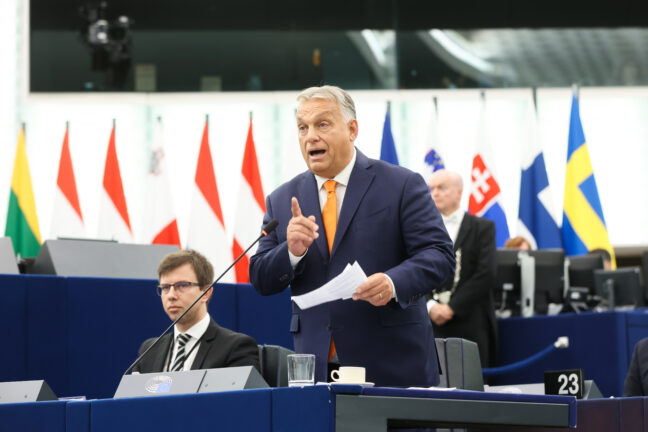Brussels has sounded another siren over Hungary’s growing democratic deficit. The European Parliament’s civil liberties committee has backed a scathing report branding the country a “hybrid autocracy”, urging Article 7 sanctions. Meanwhile, elusive conditionality leaves the EU’s flagship rule-of-law machinery sputtering.
The European Parliament’s Committee on Civil Liberties, Justice and Home Affairs (LIBE ) adopted on Wednesday, 5 November its second interim verdict on Hungary’s democratic decline. “The lack of decisive action by the Commission and the Council against Hungary has allowed a continuous erosion of democracy and the rule of law,” said MEP Tineke Strik (Greens-EFA/NED), rapporteur for the report, after it sailed through by 51 votes to 21.
LIBE has grown tired of pleading. It first triggered the Article 7 procedure in 2018, hoping to prod Hungary back into line. Instead Prime Minister Viktor Orbán has both hardened his stance at home and wielded his veto abroad. The committee therefore urged governments to move from prevention to punishment and to strip Budapest of voting rights under Article 7(2).
Its warning was stark: Hungary now amounts to a “hybrid regime of electoral autocracy”. LIBE blamed member states for dithering and drew comfort from an opinion issued by Tamara Ćapeta, an advocate-general at the European Court of Justice, who said the Commission could sue a member if the “negation of a value” caused other breaches of EU law. MEPs want that weapon unsheathed.
You might be interested
Hungary’s tangled web
Judicial meddling tops the charge sheet. The Kúria, Hungary’s supreme court, has reviewed EU rulings, flouting treaty doctrine. Corruption seeps into elections through clientelist networks, while a new Integrity Authority struggles to guard EU cash. Cohesion funds have begun to flow again—even as Budapest refuses to carry out verdicts from Strasbourg on human rights.
Civil society finds itself cornered. The government allocates state advertising to friendly outlets and weakens the National Judicial Council. It has imposed a de facto constitutional ban on Pride marches and left media pluralism gasping. A budding espionage probe inside EU institutions adds intrigue.
“The EU cannot allow Hungary’s autocratization to continue,” Ms Strik went on, adding that any further Council delay “would violate the very values it claims to uphold.” Her words echoed across a Union grappling with war on its eastern flank and populists at home. Many fear the rot will spread if left untreated.
Money talks
The Commission once hoped to curb illiberalism by squeezing wallets. In late 2022 it froze €6.3bn of cohesion funds after Hungary failed to meet “super milestones” on public procurement and graft. Another €9.6bn in post-pandemic grants and loans stayed locked behind similar conditions. Sizeable sums remain out of reach—yet the message has blurred. Brussels also invoked “horizontal enabling conditions” to suspend €22bn under the cohesion rulebook, only to lift part of the freeze months later. Governments fret that leverage is slipping.
The lack of decisive action by the Commission and the Council against Hungary has allowed a continuous erosion of democracy and the rule of law. — MEP Tineke Strik (Greens-EFA/NED)
Civil-liberty campaigners spy a broader malaise. Liberties, a network of NGOs, inspected more than 500 Commission recommendations since 2022 and found most were mere repeats. “In the 2025 cycle, 93 per cent of all recommendations made by the EU were repeats from previous years, many copied word-for-word,“ its report says. Only six percent of them have seen full enaction. Hungary leads the league of laggards, but Germany, Italy and others also ignore Brussels with impunity.
Recommendations vanish without trace, says Liberties. Deadlines rarely exist, benchmarks stay fuzzy and monitoring fizzles. Predictable warnings let governments test limits. Once institutions corrode, they are hard to rebuild. The Rule of Law Report was meant to sound an alarm; instead it risks becoming background noise.
Will to wield the toolkit
The Commission vows to toughen the cycle from 2028, linking fresh money to compliance. Liberties wants faster change. Without it, the watchdog may sink into symbolism, exposing a gap between grand rhetoric abroad and toothless discipline at home.
Analysis by the Centre for European Reform sketches the same pattern. Brussels has acquired new tools—conditionality, infringement suits, even frozen funds—but uses them sparingly. The number of legal actions has plummeted since the early 2000s as officials chose dialogue over confrontation. Record fines on Poland in 2021 and on Hungary in 2024 stand out as rare jolts.
In the 2025 cycle, 93 per cent of all recommendations made by the EU were repeats from previous years, many copied word-for-word. — Liberties, an NGO association
The think-tank argues that transparency would blunt charges of politicisation. Delaying the 2024 Rule of Law Report, reportedly to spare Italy a scolding before Ursula von der Leyen’s re-election bid, did the opposite. So did timing the December 2023 payout to Hungary with a crunch vote on Ukraine. Clear deadlines and open reasoning could restore trust.
A test of resolve
No new gadget is needed, says the CER; only the nerve to act sooner. Infringements, conditionality and Article 7 already exist. Used briskly they could deter backsliding before it deepens. Waiting for domestic opposition to succeed—Poland’s route—may prove costly elsewhere. “Robust enforcement would help to avoid complaints and lawsuits by the European Parliament for failing to hold rule-breakers accountable,“ is said in its analysis earlier this year.
Hungary remains the Union’s sorest headache, but not the only one. Slovakia toys with control of public media and corruption probes. Bulgaria battles judicial paralysis. Italy’s press endures vexatious lawsuits. Enlargement looms, raising the stakes: if enforcement falters in a club of 27, it will strain in a bloc of 35.
Robust enforcement would help to avoid complaints and lawsuits by the European Parliament for failing to hold rule-breakers accountable. — Centre for European Reform
A lot of decision-making is left for the Council. Governments groan at Mr Orbán’s veto antics but shy away from the nuclear option of suspending his vote. They fear setting a precedent or stoking domestic rows. But dithering carries its own cost. Values erode, credibility wanes and illiberal ideas gain admirers.











